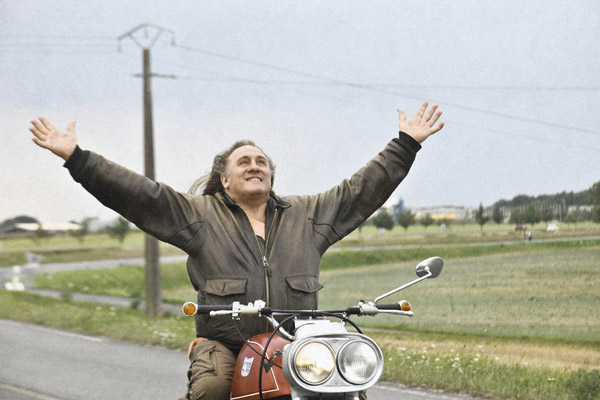
Gérard Depardieu in MAMMUTH (Photo: Olive Films)
Written & Directed by Benoît Delépine and Gustave Kervern
Produced by Jean-Pierre Guerin
Released by Olive Films
French with English subtitles
France. 92 min. Not rated
With Gérard Depardieu, Yolande Moreau, Isabelle Adjani & Miss Ming
At this point in his storied career, it’s difficult to see Gérard Depardieu on screen as anyone other than international star Gérard Depardieu. Once a mere burly actor with a bulbous nose, he now has so much girth that he seems to fill the screen from every angle. That’s what made his performance in Claude Chabrol’s last film, Inspector Bellamy, eye-opening. He brought a welcome world-weariness to the role of a retired detective taking on one last case, and the heaviness of spirit joined that of body to create a memorably pained character.
In Mammuth, Depardieu again assays a role of a retirement-age man. This time, he runs into the bureaucratic machinery that refuses him his retirement pension. He doesn’t have the proper documentation to receive it, so he must go off to collect missing affidavits from his past employers. With long, curly tresses that make him resemble Mickey Rourke in The Wrestler and a has-been singer in a hair-metal band, Depardieu easily slips into his role as an unassuming, and initially unfeeling, man considered by others as a fool. (His real name is Serge; his nickname comes from the motorcycle he rode years ago and takes on the road again.)
The movie is anything but sentimental despite this plot summary. In fact, it’s almost aggressively the opposite as it attempts to place Mammuth in a world of alienation and isolation, of people whose tunnel vision blinds them to others. Of course, Mammuth is part of that world, and he would probably prefer that others don’t notice him. But this isn’t really explored by the filmmakers, who are too busy trying to create wall-to-wall aimlessness and self-indulgence in vignettes that loudly yell “people are weird!” After all, why should Mammuth try to fit in in such a world, epitomized by a pointless scene in a small restaurant where a guilt-ridden man, talking to his young daughter on a cell phone, begins sobbing, soon joined by the tears of Mammuth and two other men, all dining alone?
As that scene shows, the directors have loaded the dice so that nearly every person Mammuth meets or every situation he finds himself in is another example of a disconnection. It starts at the beginning, during Mammuth’s impromptu retirement party at the meatpacking factory where he works. In a cramped room, a supervisor speaks by rote about his years on the job while his fellow workers stand around like zombies, silently eating whatever’s laid out in front of them while he accepts a jigsaw puzzle as a going-away present.
Later, Mammuth goes to the supermarket where his wife works, and has difficulty extricating a cart from the line up outside the store. Inside, he strolls by a man who has passed out in an aisle and gets into an argument with the man behind the meat counter, which ends with profane insults flying thick and fast. He then checks out in his wife’s cashier line, and she berates him, saying that she could be fired for checking out a family member’s groceries. To top the outing off, he tries to squeeze his cart between two cars but gets it stuck, scratching the sides of both vehicles in the process. He finally picks up his bag of groceries and departs.
Piling on absurdities that create a lopsided view of a society to which Mammuth has no discernable ties, the filmmakers throw the kitchen sink into the morass, and the result is a fitfully amusing but dramatically incoherent mess. (“Socially disabled” is how the directors describe Depardieu’s character.) That incoherence takes center stage once Mammuth hits the road. Soon he is haunted by the specter of a long-lost love, played by Isabelle Adjani in semi-hysterical mode. The streaked blood on her face shows that she died violently as a young woman (Adjani is nearly the same age as Depardieu; why would the dead woman age?), and she periodically appears to admonish or comfort
Mammuth.
Moving in fits and starts, the movie crosscuts between Mammuth running into roadblocks looking for his papers (and when he finds some, he stupidly puts them in a box on the back of his bike, and soon the papers fly out all over the place) and his brusque but dutiful wife Catherine. She discovers that he has lost the cell phone she lent him and begins the arduous journey of tracking down the woman who stole it.
Finally, Mammuth visits a cousin he hasn’t seen in decades and meets his young niece Solange, who strangely calls herself Miss Ming (or maybe not so strangely, since an actress named Miss Ming plays the role, stiffly and unpersuasively). He comes out of his anti-social shell the more time he spends with her, but even with his (nameless) male cousin and niece, the directors cannot leave well enough alone. When Mammuth and the cousin reunite, we next see them masturbating each other, apparently leaving off from what they enjoyed doing together when younger.
Shooting in picturesque French locations, the directors present a portrait of a country in turmoil and decline, where even the countryside and small towns look rundown due to their proximity to the losers inhabiting them. However, there are glorious cameos from two of French-speaking cinema’s finest performers (Benoit Poelvoorde as a competitive treasure hunter and Anna Mouglalis as a duplicitous one-night stand), while Yolande Moreau is excellent as Mammuth’s exasperated but loving wife. But it’s Depardieu who holds this flimsy movie together by carrying it on his broad shoulders to the finish line.






Leave A Comment